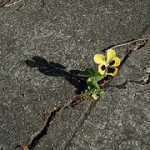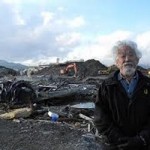Cliff dwellers and others find urban settings similar to their natural habitats.
by David Suzuki
Have you ever thought about the grass that grows in sidewalk cracks? These hardy plants are generally written off as undesirable. They’re routinely trampled, savaged by extreme summer heat, washed out by rainfall and buried by winter snow. To survive these conditions is a testament to the plants’ resilience, but they rarely get much love or attention.
That’s why I’m intrigued with the work of Nova Scotia researcher Jeremy Lundholm and his team at Saint Mary’s University. They’ve been examining plant species in sidewalk cracks and other nooks and crannies in Halifax. Their research demonstrates something simple and surprising: hardy species found in these environments are similar to those occupying nature’s own inhospitable spaces — steep cliffs and barren rock slopes.
We should recognize that urban spaces are in many ways “structurally and functionally equivalent” to natural ecosystems.
While the connection between pavement and cliff face isn’t immediately obvious, it makes sense. Plant species that succeed in sidewalk cracks have similar qualities to ones that have adapted to inhabit crevices in exposed, rocky, windswept places.
As Lundholm says, this sort of research demonstrates that rather than seeing our communities as entirely human-created, unnatural environments, we should recognize that urban spaces are in many ways “structurally and functionally equivalent” to natural ecosystems.
In a recent article forThe Nature of Cities, ecologist Eric W. Sanderson suggests we try to “conceive of cities in their entirety as ecological spaces.” This vision of the city as ecosystem includes all streets, sidewalks, buildings and parking lots interacting in a vibrant ecological mosaic with soil, water, air and “everyone and everything that participates in the great congress of life on Earth.”
Sanderson says looking at the built landscape of our towns and cities this way allows fascinating comparisons: steep cliff and tall skyscraper, parkland and meadow, gutter and stream. The urban environment contains numerous ecological niches that have analogues elsewhere in nature. It’s just a relatively new type of landscape.
Some songbirds have learned to survive in noisy urban landscapes by changing the melodies they use to communicate.
And within this complex urban ecosystem, species are constantly adapting. The Smithsonian Conservation Biology Institute’s Migratory Bird Center found their subjects often adapt to human environments. Some songbirds have learned to survive in noisy urban landscapes by changing the melodies they use to communicate. They sing higher notes to trump ambient background city noise and deeper notes in areas with many buildings and hard surfaces. Nesting on the ledges of high-rises rather than cliff faces has even helped peregrine falcons adjust to city life and assisted their dramatic post-DDT comeback.
Yet, while some of our feathered friends and crevice-loving plants have been adapting, the speed and scale of urbanization in Canada has pushed many native species to the brink of extinction.
Ducks Unlimited found that over 72 percent of the original wetlands in southern Ontario have been developed, and the region is now home to about one third of the province’s species at risk. In British Columbia, more than 100 imperilled plants and animals are found in the Metro Vancouver area.
While we need to show some love to the current occupants of nooks and crannies, we must also redouble our efforts to bring nature back to the city and enhance what assets remain.
Efforts like the RONA Urban Reforestation program are on the right track. The hardware retailer is helping to green urban spaces with its support for planting thousands of trees in Canada’s cities. This past summer it also started a pilot program aimed at promoting native shrubs and trees through in-store nurseries.
Planting native species in our gardens and communities is increasingly important, because indigenous insects, birds and wildlife rely on them. Over thousands, and sometimes millions, of years they have co-evolved to live in local climate and soil conditions.
Planting native species in our gardens and communities is increasingly important, because indigenous insects, birds and wildlife rely on them.
To find out more about the benefits of planting indigenous species, contact the North American Native Plant Society or check out the excellent Grow Me Instead guides available for several provinces.
Ultimately we need to recognize that while humans continue to build urban landscapes, we share these spaces with others species. Nature surrounds us, from parks and backyards to streets and alleyways. Next time you go out for a walk, tread gently and remember that we are both inhabitants and stewards of nature in our neighbourhoods.
Written with contributions from David Suzuki Foundation Communications Specialist Jode Roberts. For more insights from David Suzuki, please read Everything Under the Sun (Greystone Books/David Suzuki Foundation), by David Suzuki and Ian Hanington, now available in bookstores and online.



